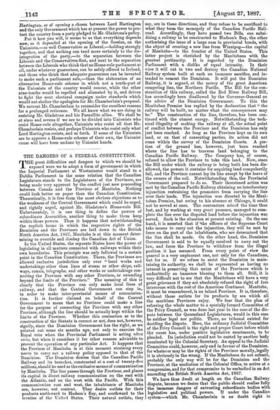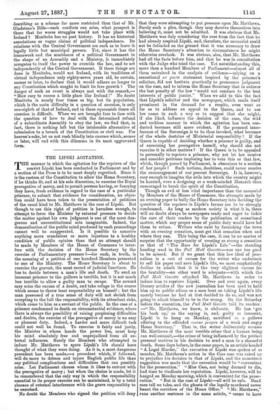THE DANGERS OF A FEDERAL CONSTITUTION.
T. great difficulties and dangers to which we should be exposed were we to adopt a form of government in which the Imperial Parliament at Westminster would stand to a Dublin Parliament in the same relation that the Canadian Legislature stands to the Legislatures of the Provinces, are being made very apparent by the conflict just now proceeding between Canada and the Province of Manitoba. Nothing could look better on paper than the Canadian Constitution. Theoretically, it is free from the most obvious objections as to the weakness of the Central Government which could be urged, and rightly urged, against Mr. Gladstone's Home-rule Bill. Unfortunately, it is one thing to define the powers of subordinate Assemblies, another thing to make them keep within those powers. Thus it happens that notwithstanding the explicit terms in which the respective rights of the Dominion and the Provinces are laid down in the British North America Act, 1807, Manitoba is at this moment deter- mining to override and disobey the Canadian Act of Union.
In the United States, the separate States have the power of legislating in all matters connected with railways within their own boundaries. This principle was only followed to a certain point in the Canadian Constitution. There, the Provinces are allowed exclusive jurisdiction only over "local works and undertakings other than lines of steam or other ships, rail- ways, canals, telegraphs, and other works or undertakings con- necting the Province with any other Province, or extending beyond the limits of the Province." The meaning of this is clearly that the Province can only make local lines of railway, and that the Central Government can step in, in order to make inter-provincial means of communica- tion. It is further claimed on behalf of the Central Government to mean that no Province could make a line for the purpose of connecting the Province with any other Province, although the line should be actually kept within the limits of the Province. Whether this contention as to the construction of the Statute is correct or not, does not, however, signify, since the Dominion Government has the right, as we pointed out some six months ago, not only to exercise the Royal veto when the Provincial Parliament is acting ultra tires, but when it considers it for other reasons advisable to prevent the operation of any particular Act. It happens that the Province of Manitoba is at this moment straining every nerve to carry out a railway policy opposed to that of the Dominion. The Dominion desires that the Canadian Pacific Railway and its branches, constructed at a cost of twenty-five millions, should be used as the exclusive means of communication by Manitoba. The line passes through the Province, and places its capital in direct railway communication on the east with the Atlantic, and on the west with the Pacific. With this communication east and west, the inhabitants of Manitoba are, however, not content. They desire outlets for their products northward to Hudson's Bay, and southward to the frontier of the United States. Their natural outlets, they
say, are in these directions, and they refuse to be sacrificed to what they term the monopoly of the Canadian Pacific Rail- road. Accordingly, they have passed two Bills, one subsi- dising a railway to be constructed to Hudson's Bay, the other authorising the issue of a large sum in provincial bonds, with the object of creating a new line from Winnipeg—the capital of Manitoba—to the frontier of the United States. This latter project is cherished by the Manitobans with the greatest pertinacity. It is regarded by the Dominion Parliament with a dislike of equal intensity. In their view it will cut in two and destroy the Canadian National Railway system built at such an immense sacrifice, and in- tended to cement the Dominion. It will put the Dominion Railway, it is argued, at the mercy of the great American competing line, the Northern Pacific. The Bill for the con- struction of this railway, called the Red River Railway Bill, has accordingly been disallowed by the Governor-General on the advice of the Dominion Government. To this the Manitoban Premier has replied by the declaration that " the railway will be built, no matter what the consequences may be." The construction of the line, therefore, has been con- tinued with the utmost energy. Notwithstanding the tech- nical illegality of making the railway at all, the actual point of conflict between the Province and the Dominion has only just been reached. As long as the Province kept on its own land, or on that of consenting parties, its action did not come within the survey of the Dominion Courts. A por- tion of the ground has, however, just been reached where the line has to traverse land belonging to the Canadian Pacific Railway. The Company has, of course, refused to allow the Province to take this land. Now, since the Bill under which the railway is being built has been dis- allowed, the powers it contains for acquiring land compulsorily fail, and the Province cannot lay its line except by the leave of the owners of the soil. Notwithstanding this, the Provincial Government prepared to do so. Their threatened action was met by the Canadian Pacific Railway obtaining an interlocutory injunction restraining the promoters from carrying the line over their lands. The injunction was directed to the Mani- toban Premier, but owing to his absence at Chicago, it could not be served at once. The contractors seized the time thus lost, and by working at very great pressure, managed to com- plete the line over the disputed land before the injunction was served. Such is the situation at present existing. On the one hand, it is asserted that if khe officers of the Supreme Court take means to carry out the injunction, they will be met by force on the part of the inhabitants, who are determined that the line shall be made. On the other hand, the. Dominion Government is said to be equally resolved to carry out the law, and force the Province to withdraw from the illegal position it has assumed. From every point of view the quarrel is a very unpleasant one, not only for the Canadians, but for us. If we refuse to assist the Dominion in main- taining its authority, we shall be represented as having no interest in preserving that union of the Provinces which is undoubtedly an immense blessing to them all. Still, it is very difficult not to see that the Manitobans will have a very great grievance if they are absolutely refused the right of free interconse with the rest of the American Continent. Manitoba, it must be remembered, is an inland Province. It is, therefore, without those outlets for its products by sea which all the maritime Provinces enjoy. We fear that the plan of referring the whole matter to a specially formed Committee of the Privy Council, as was done last year in the case of the dis- pute between the Queensland Legislatures, would in this case be neither legal nor politic. There, no tribunal existed for deciding the dispute. Here, the ordinary Judicial Committee of the Privy Council is the right and proper Court before which the cause has, under positive legislative enactments, to be pleaded. Its jurisdiction could not be ousted by another body nominated by the Colonial Secretary. An appeal to the Judicial Committee could, however, only end in favour of the Dominion, for whatever may be the rights of the Province morally, legally it is obviously in the wrong. If the Manitobans do not submit, probably the only way will be for the Dominion and the Province, at the mediation of the Colonial Office, to arrive at a compromise, and for that compromise to be embodied in an Act amending the British North America Act, 1867.
We have thus dwelt at length on the Canadian Railway dispute, because we desire that the public should realise frilly the immense dangers of entrusting subordinate bodies with legislative and political powers. If under the Canadian system—which Mr. Chamberlain is no doubt right in
describing as a scheme far more restricted than that of Mr. Gladstone's Bills—such conflicts can arise, what prospect is there that far worse struggles would not take place with Ireland Manitoba has no past history. It has no historical associations or vague claims of political independence. Its relations with the Central Government are such as to leave it legally little but municipal powers. Yet, since it has the framework and the semblance of a political Government in the shape of an Assembly and a Ministry, it immediately arrogates to itself the power to override the law, and to act independently of the Central Government. If these things are done in Manitoba, would not Ireland, with its traditions of virtual independence only eighty-seven years old, be certain, sooner or later, to declare that it would adhere no longer to any Constitution which sought to limit its free growth ? The danger of such an event is always met with the remark,— " How easy to coerce a little place like Ireland !" No doubt Manitoba is nearly four times as big, but its population, which is the main difficulty in a question of coercion, is only one-eighth of that of Ireland, and in these squeamish times all coercion is difficult. When we are brought face to face with the question of how to deal with the determined refusal of a subordinate Assembly to obey the law, we find that, in fact, there is nothing left but the intolerable alternative of submission to a breach of the Constitution or civil war. For heaven's sake, let us not rush blindly into courses which, sooner or later, will end with this dilemma in its most aggravated form.



































 Previous page
Previous page